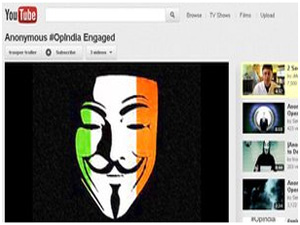



Date:19/05/12
 The hacker group Anonymous has carried out a series of attacks against websites in India. Websites for government departments, India's Supreme Court and two political parties all came under attack.
The hacker group Anonymous has carried out a series of attacks against websites in India. Websites for government departments, India's Supreme Court and two political parties all came under attack.
Anonymous said the attacks were carried out in retaliation against blocks imposed on well-known video and file-sharing sites.
The Indian anti-piracy firm behind the blocking of Vimeo, DailyMotion and The Pirate Bay was also attacked. In late March, Chennai-based Copyrightlabs won a restraining order that made Indian ISPs and phone firms stop their customers reaching sites that were illegally sharing copies of Bollywood films called 3 and Dhammu.
As the the blocks started to come into force in mid-May, Anonymous launched attacks against 14 separate government and political sites. Hit hardest were the Indian telecoms department, electronics and IT ministry, supreme court and sites used by the BJP and INC political parties which were all knocked offline. The website of Copyrightlabs was also "down for maintenance" during the attacks.
In tweets documenting its ongoing hack attacks, Anonymous said they were being carried out in retaliation for "internet censorship" in India.
To knock out the sites, Anonymous bombarded them with data, a tactic known as a Distributed Denial of Service (DDoS) attack.
The tactic had only partial success as most of the sites targeted soon recovered and were only offline intermittently.The disabling of the websites was the first tangible result actions of the OpIndia campaign announced by Anonymous on 9 May in a message posted to YouTube.
Anonymous attacks Indian government websites
 The hacker group Anonymous has carried out a series of attacks against websites in India. Websites for government departments, India's Supreme Court and two political parties all came under attack.
The hacker group Anonymous has carried out a series of attacks against websites in India. Websites for government departments, India's Supreme Court and two political parties all came under attack.Anonymous said the attacks were carried out in retaliation against blocks imposed on well-known video and file-sharing sites.
The Indian anti-piracy firm behind the blocking of Vimeo, DailyMotion and The Pirate Bay was also attacked. In late March, Chennai-based Copyrightlabs won a restraining order that made Indian ISPs and phone firms stop their customers reaching sites that were illegally sharing copies of Bollywood films called 3 and Dhammu.
As the the blocks started to come into force in mid-May, Anonymous launched attacks against 14 separate government and political sites. Hit hardest were the Indian telecoms department, electronics and IT ministry, supreme court and sites used by the BJP and INC political parties which were all knocked offline. The website of Copyrightlabs was also "down for maintenance" during the attacks.
In tweets documenting its ongoing hack attacks, Anonymous said they were being carried out in retaliation for "internet censorship" in India.
To knock out the sites, Anonymous bombarded them with data, a tactic known as a Distributed Denial of Service (DDoS) attack.
The tactic had only partial success as most of the sites targeted soon recovered and were only offline intermittently.The disabling of the websites was the first tangible result actions of the OpIndia campaign announced by Anonymous on 9 May in a message posted to YouTube.
Views: 609
©ictnews.az. All rights reserved.Similar news
- Cellphone Use May Raise Cancer Risk
- Australian police pushes cyber safety education
- Vietnam aims to lead in e-government
- Senate Website Gets Hacked
- US builds net for cyber war games
- Japan enacts anti-computer virus law
- India passes law vs e-waste
- Anonymous Declares War On The City Of Orlando
- Microsoft highlights evolving dangers as online identity data proliferates
- Consumers want internet security to be provided by banks
- Government facilities targets of cyber attack
- South Korean web attacks might been war drill
- Sri Lanka to Establish National Passport Database to Increase Border Security
- Hi-tech crime agencies set to employ information security professionals
- Phone hacking and online campaign bring down the News of the World





















